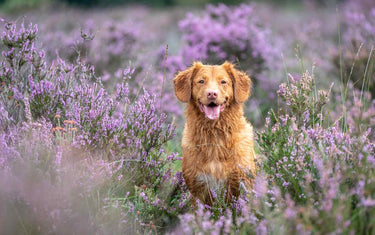5 min read / 27 July 2023 / Laura Garvin Gomez
Is Lavender Oil Safe for Dogs?
Explore the safety of Lavender Oil for dogs in our informative blog. Gain valuable insights and responsible guidance for your beloved pet's well-being.
Share this post

Many people love to use lavender oil around the home due to its lovely floral scent and ability to create a soothing atmosphere.
For pet owners, “Is lavender essential oil safe for dogs?” is a common question asked when looking for a natural method of calming and soothing ailments.
Before giving your dog lavender oil, read through our guide on how it should be applied, the benefits they can enjoy and the risks to be aware of.
Benefits of lavender oil for dogsDogs can benefit from topical application of lavender oil in several ways, including:
|

Is lavender oil safe for dogs?
It is generally thought that using lavender essential oil for dogs is perfectly safe, as long as the solution has been properly prepared and diluted with a carrier oil. Many dog owners use the oil to soothe irritation, scratching, inflammation and to help their pets feel more relaxed.
There are two different types of lavender oil that owners need to be aware of when applying topically, as one is safe for dogs to use, whilst the other should be avoided.
Topical application of lavender oil is perfectly fine, but the presence of two compounds – linalyl acetate and linalool – can make it too toxic for dogs to consume. Due to its highly concentrated nature, there are more of these compounds in the oil than the flower, so even if your dog only consumes a small amount of the oil, it could cause them to fall ill.
Pay attention to your dogs reaction
The best way to tell if lavender oil is right for your dog is pay attention to their reaction. A good place to start before topical application is to diffuse the oil to see how your dog reacts.
If they like to spend time around the aroma then it could be a good fit, but if they actively try to avoid it then it perhaps isn’t for them. When a dog pants, whines or rubs their face on the carpet when the oil is being diffused, take these as signs that they do not like the oil and try something else.

How to give lavender oil to your dog
Here are a few different ways you can give lavender oil to your dog at home:
- Use a diffuser: A good way to enjoy lavender oil at home with your dog is to diffuse the scent. A dog’s nose is a lot stronger than our own, so remember to position it in a place that they do not spend too much time in during the day.
- Rub onto their ears: For a more direct method you can dilute lavender essential oil with a carrier oil, massage it onto your hands and rub a small amount onto your dog’s ears. Do not apply the oil to sensitive parts of their body and in areas where they can easily lick it off and digest.
- Scent a stuffed toy: If your dog has a favourite stuffed toy they love to cuddle up with in their bed, then you could add a few drops of essential oils to make them feel more comfortable and appealing.
What are the risks of giving lavender essential oil to your dog?
Like all essential oils, lavender oil is highly concentrated, so even humans must be careful about how they use and apply it. This is also true of dogs, who can experience an allergic reaction if the oil is not prepared or diluted correctly.
Symptoms of an allergic reaction in dogs include an upset stomach, inflamed skin, chronic infections, or respiratory difficulty. Always read the instructions and warnings that come with the oil before you use it.
You can minimise the risks of using lavender oil for your dog by:
- Only using it in affected areas: If you are using the oil to calm a rash or similar treatment, only apply the oil sparingly to the affected areas and in places where your dog cannot easily lick it off. Limiting the amount of oil you use reduces the chances of them ingesting it and falling ill.
- Always dilute the oil: Lavender oil should always be diluted before application, a rule that applies to both humans and dogs. It significantly reduces the high concentration levels of the oil and lowers the chances of your dog experiencing an allergic reaction.
- Store in a safe place: Keep your lavender oil in a safe place that is out of the reach of your dog. They are inquisitive souls, and you don’t want them to be overexposed to the oil when they are not being properly supervised.

Providing that the oil is diluted and applied correctly, lavender oil is safe for dogs to use. From helping to soothe your dog’s emotional state to protecting them against insects or illness, there are lots of ways it can benefit them. Do not allow your dog to ingest the oil and before you start using it, speak with your local vet about whether it is suitable for your four-legged best friend.










